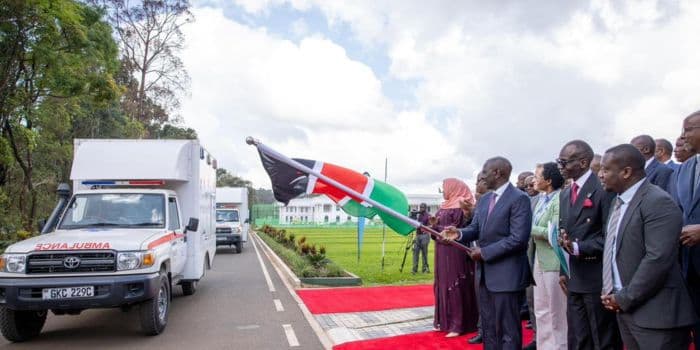We're loading the full news article for you. This includes the article content, images, author information, and related articles.
President William Ruto has mandated that all public and private hospitals must report every maternal and child death to the Digital Health Authority, warning that facilities hiding data will face consequences as Kenya struggles with an unacceptably high mortality rate.

President William Ruto on Wednesday, November 19, 2025, issued a stern directive to all healthcare facilities in Kenya, ordering the mandatory and real-time reporting of all maternal and infant deaths. This move is a direct response to concerns that some hospitals are concealing or failing to report accurate mortality data, a practice the President stated has hampered efforts to address the nation's high maternal death rates. The new mandate requires both public and private institutions to submit this critical data to the recently established Digital Health Authority (DHA).
Speaking at an event at State House, Nairobi, where the World Health Organization (WHO) handed over ambulances and medical supplies, President Ruto expressed his dismay at the country's maternal mortality statistics. "Maternal and newborn mortalities remain unacceptably high. No woman should die while giving birth, and no baby should be lost to preventable causes," he stated. According to the Kenya Demographic and Health Survey (KDHS) 2022, Kenya's maternal mortality ratio (MMR) stands at 355 deaths per 100,000 live births, which translates to approximately 6,000 maternal deaths annually. The infant mortality rate is 32 deaths per 1,000 live births. The President noted that these figures are far above the global benchmark of 70 deaths per 100,000 live births targeted under the Sustainable Development Goals.
The President's directive is part of a broader push for accountability and transparency within Kenya's healthcare system. "I know that there are facilities that continue to hide this data," President Ruto remarked, emphasizing that accurate, real-time data is essential for the Ministry of Health to formulate effective interventions and allocate resources where they are most needed. The Digital Health Authority, established under the Digital Health Act of 2023, will serve as the central repository for this data, enabling better monitoring and planning. This legislation is one of four new acts aimed at achieving Universal Health Coverage (UHC) by transforming healthcare financing and delivery.
To enforce this new reporting requirement, the Ministry of Health has been instructed to conduct a comprehensive survey of all counties by March 2026 to identify regions with the highest mortality rates and investigate the underlying causes. Health Cabinet Secretary Aden Duale had previously warned in October 2025 that health facilities with persistently high maternal deaths could have their licenses revoked, signaling a zero-tolerance approach to negligence and poor-quality care. The government's strategy, titled 'No Woman Should Die While Giving Life,' will target over 20 counties with the highest maternal death rates, including Tana River, Garissa, Samburu, Marsabit, and Siaya.
The high number of maternal deaths in Kenya is often attributed to preventable causes such as postpartum haemorrhage, infections, and hypertensive disorders, which are exacerbated by systemic issues. These include a lack of skilled birth attendants, inadequate medical supplies, poor-quality care, and weak referral systems. A Ministry of Health assessment found that only four out of ten health facilities in the country have the capacity for mothers to deliver effectively.
The donation from the WHO, which included 14 advanced life-support ambulances and 223 oxygen cylinders, is intended to bolster the national emergency response system and improve maternal and reproductive health services, particularly in the hardest-hit counties. President Ruto stated that the equipment would be integrated into the national referral system under the Social Health Authority (SHA) and would be measured "not in numbers, but in lives saved, babies supported, and communities strengthened." This initiative is part of the government's broader 'Every Woman, Every Newborn, Everywhere' agenda, which focuses on equipping frontline health teams and ensuring high-quality, respectful care.
The government's renewed focus on data accuracy and accountability aims to create a healthcare system where every maternal and infant death is not just a statistic, but a lesson learned to prevent future tragedies. The success of this directive will depend on the stringent enforcement of reporting standards and the effective use of the collected data to drive meaningful improvements in maternal and child health across the nation.
Keep the conversation in one place—threads here stay linked to the story and in the forums.
Sign in to start a discussion
Start a conversation about this story and keep it linked here.
Other hot threads
E-sports and Gaming Community in Kenya
Active 9 months ago
The Role of Technology in Modern Agriculture (AgriTech)
Active 9 months ago
Popular Recreational Activities Across Counties
Active 9 months ago
Investing in Youth Sports Development Programs
Active 9 months ago
Key figures and persons of interest featured in this article